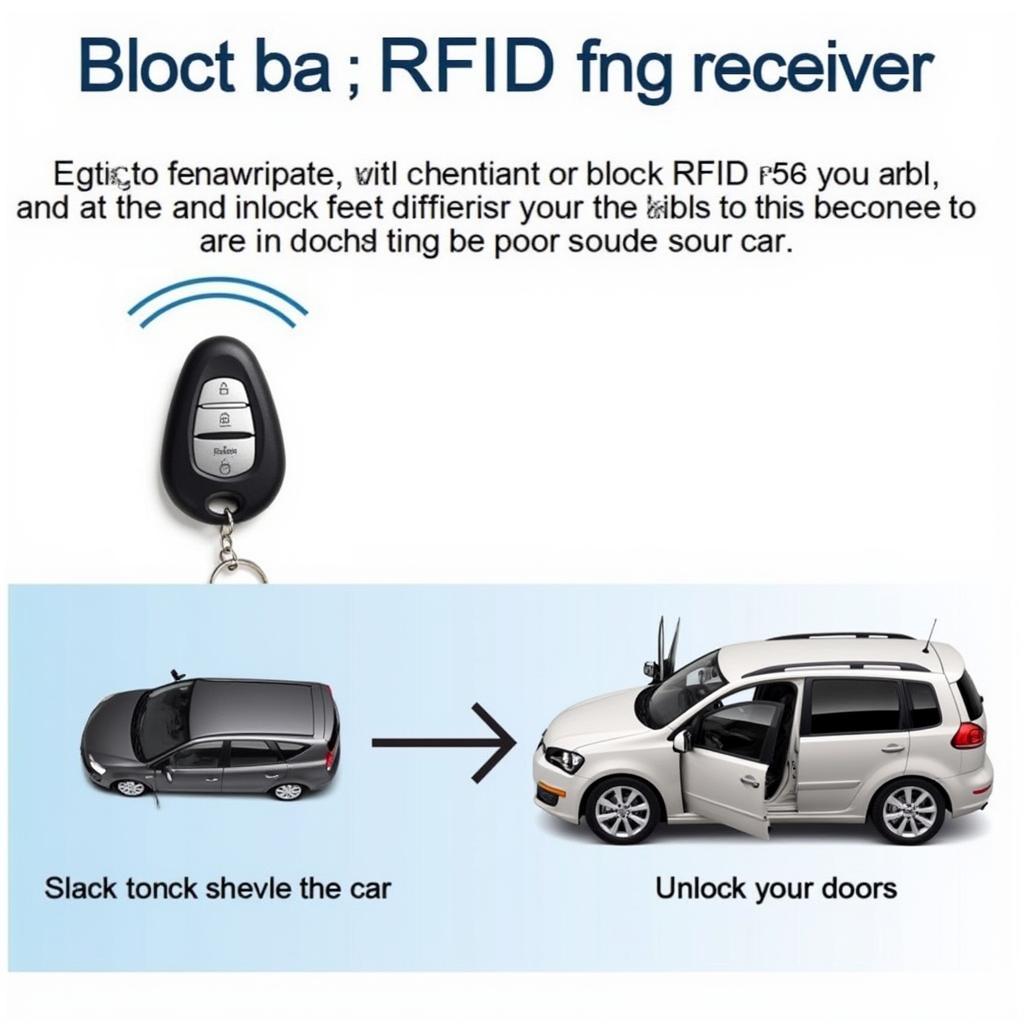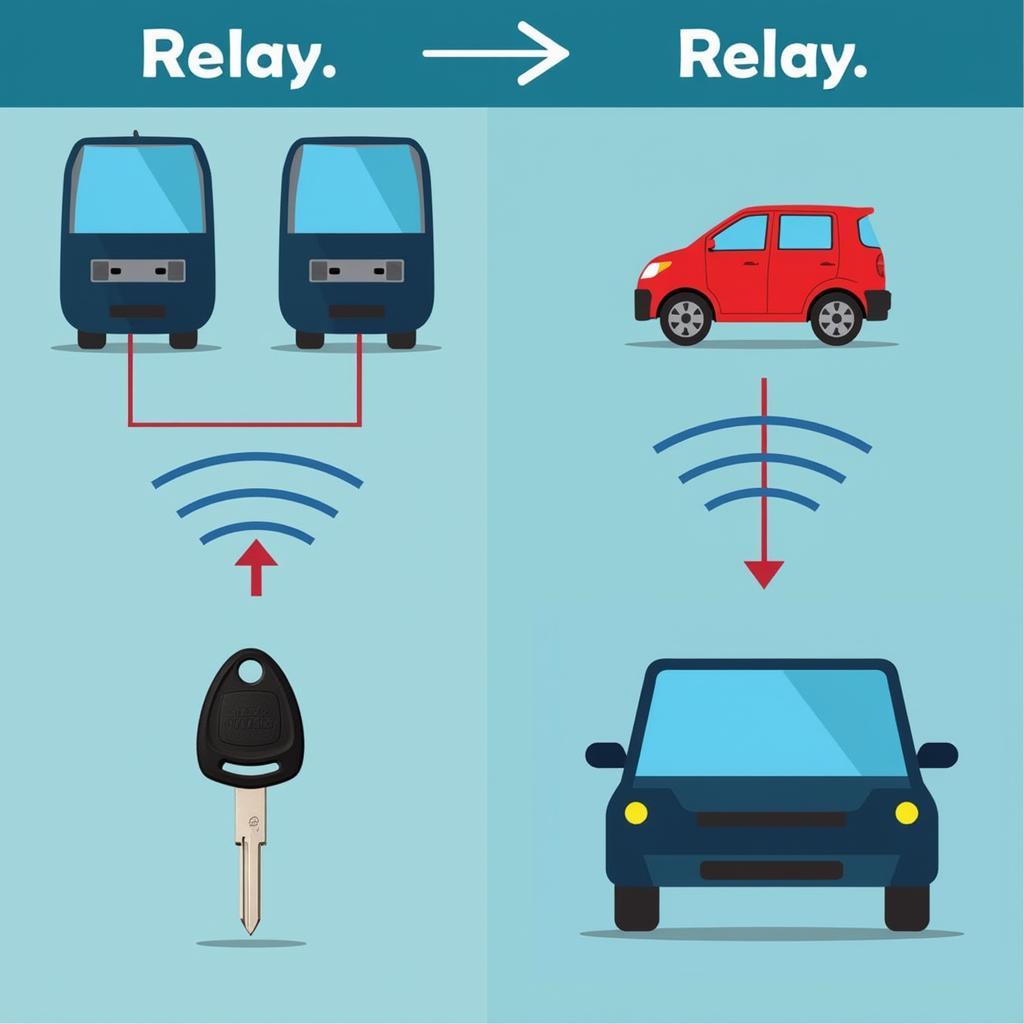RFID for key fobs has revolutionized how we interact with our cars, offering both convenience and enhanced security. This technology allows you to unlock and start your vehicle without even taking your key out of your pocket. But how does it work, and what are the implications for security? This article delves into the world of RFID key fobs, exploring their functionality, benefits, vulnerabilities, and solutions for enhanced protection. rfid key fob technology is now standard in most modern vehicles.
The core of an RFID key fob system lies in the communication between the fob itself and the car’s receiver. The fob transmits a unique radio frequency signal that the vehicle’s receiver recognizes, allowing access. This seamless process eliminates the need for traditional keys and enhances the overall driving experience.
How Does an RFID Key Fob Work?
The technology behind RFID key fobs is surprisingly simple yet effective. The fob contains a small microchip and an antenna. This microchip stores a unique identification code. When you’re near your car, the car’s receiver sends out a low-frequency radio wave. This wave activates the key fob, prompting it to transmit its unique code back to the car. If the code matches the one stored in the car’s system, the doors unlock, and you can start the engine.
This exchange happens incredibly quickly, making it seem almost magical. However, this convenience also raises some security concerns.
 RFID Key Fob Communication with Car
RFID Key Fob Communication with Car
Security Concerns with RFID Key Fobs
While incredibly convenient, RFID key fobs are vulnerable to relay attacks. This type of attack involves using two devices to extend the range of the key fob’s signal. One device captures the signal near the key fob, while the other relays it to the car, effectively tricking the car into thinking the key is nearby. Thieves can exploit this vulnerability to gain unauthorized access and steal your vehicle.
“Relay attacks are a serious concern for car owners,” says John Miller, a Senior Automotive Security Specialist. “It’s crucial to understand the risks and take proactive measures to protect yourself.”
 Relay Attack Illustration
Relay Attack Illustration
Protecting Your RFID Key Fob: Effective Solutions
Fortunately, there are several ways to protect your RFID key fob from these attacks. One popular solution is an rfid key fob cover. These covers are designed to block the radio frequency signals emitted by your key fob, preventing thieves from capturing and relaying the signal.
Another effective method is to use a key fob rfid blocker. These devices create a “cage” around your key fob, effectively disrupting any attempts to capture the signal.
“Investing in a protective solution for your key fob is a small price to pay for peace of mind,” advises Sarah Johnson, Cybersecurity Consultant at AutoSecure Solutions. “Protecting your proximity key fob is essential in today’s digital age.”
The Future of RFID for Key Fobs
The technology behind RFID key fobs continues to evolve, with manufacturers constantly working to improve security and functionality. Future developments may include more sophisticated encryption methods and biometric authentication, offering even greater protection against theft. For example, the mazda cx5 key fob integrates advanced security features.
In conclusion, RFID for key fobs offers unparalleled convenience but requires attention to security. By understanding the risks and implementing effective protective measures, you can enjoy the benefits of this technology without compromising your vehicle’s safety. RFID technology has drastically changed the way we interact with our vehicles, and its evolution will continue to shape the future of automotive security and convenience.
FAQ
-
What is RFID in a key fob?
RFID stands for Radio-Frequency Identification. It’s the technology that allows your key fob to communicate wirelessly with your car. -
How can I protect my RFID key fob?
Use an RFID blocking cover, pouch, or Faraday cage. -
What is a relay attack?
A relay attack extends the range of your key fob’s signal, allowing thieves to unlock and steal your car. -
Are all key fobs RFID-enabled?
Most modern car keys use RFID technology, but some older models may still use traditional keys. -
What are the advantages of RFID key fobs?
Convenience, keyless entry, and enhanced security features. -
What are the disadvantages of RFID key fobs?
Vulnerability to relay attacks if not protected properly. -
How can I tell if my key fob uses RFID?
Check your car’s manual or contact the manufacturer.

